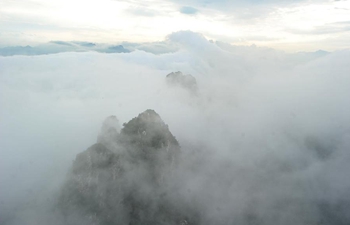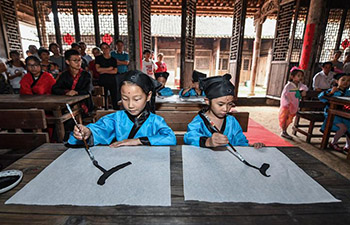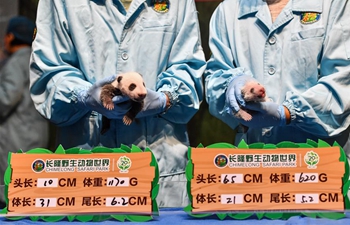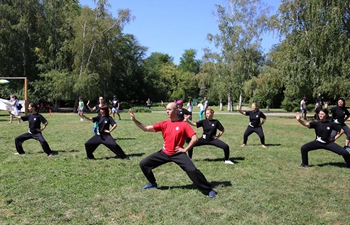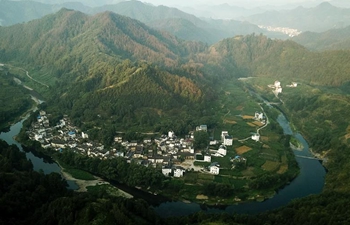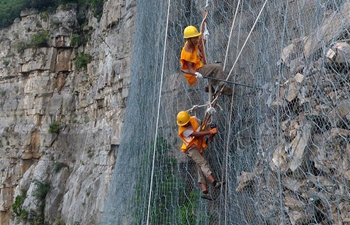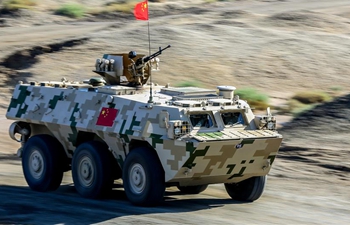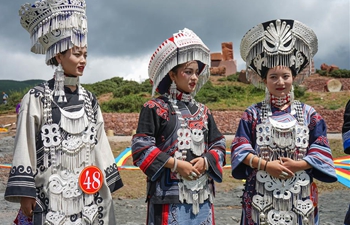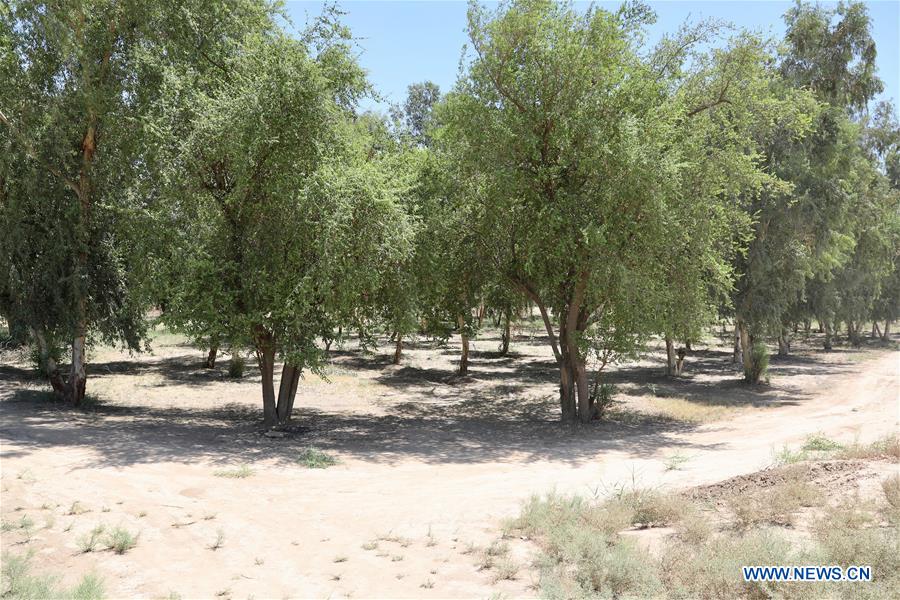 ??
??Photo taken on Aug. 11, 2018 shows plants in anti-desertification forest in southeast Baghdad, Iraq. An Iraqi agriculture expert told Xinhua in an exclusive interview that he hoped Iraq, which suffers from increasing desertification, can benefit from Chinese expertise in fighting desertification. (Xinhua/Khalil Dawood)
by Jamal Hashim, Zhang Miao
BAGHDAD, Aug. 11 (Xinhua) -- An Iraqi agriculture expert told Xinhua in an exclusive interview that he hoped Iraq, which suffers from increasing desertification, can benefit from Chinese expertise in fighting desertification.
Sarmad Kamil Ali, deputy chief agricultural engineer of Iraq's State Board of Combating Desertification, went to China in 2013 to participate in a training course held in the northwestern province of Ningxia to enrich his knowledge of combating desertification.
"The training course in China was very informative, as there were top professors from Ningxia University and other research centers. There were also field training that introduced China's achievements in combating desertification," said Ali.
Ali recalled his experience in China in 2013 when he was one of the trainees on fixing moving sand dunes with green plantation.
"We have seen many beautiful farms in areas that previously suffered from desertification, but the Chinese turned thousands of hectares of these areas into green areas and built many cities and villages there," he said.
In Iraq, up to 90 percent of its total area of 435,052 square km, is threatened by desertification, while 45 percent of the agricultural land faces draught and desertification, according to the Iraqi combating desertification board.
Ali believed that Iraq can make use of China's experience in combating desertification by increasing cooperation between the two countries.
"China has incredible experience in greening the desert and certainly it has lessons to share with Iraq as well as the world on curbing desertification," Ali said.
Ali remembered one of the sand-fixing techniques that he learned in China, known as "grid of straw squares," when Chinese farmers made thousands of roughly meter-long squares, which look like a massive fishnet over the sand and stretch for as far as the eye can see.
The straw squares hold the ground together well enough to grow some hardy species of grass, which in turn provide enough stability to cultivate larger plants.
Ali witnessed in China the grid of straw squares that was planted to fix the sand dunes in Shapotou, a town in Ningxia.
The straw grid was designed to help keep the sand from advancing to Shapotou, as well as to stabilize the ground along the rail tracks and streets and around the villages and towns.
Ali also talked about China's first railway crossing the desert and the experience that he got about controlling the sand along the Baolan Railway.
"I have seen an area which the Chinese people planted five belts of plants along the Baolan Railway to protect it from the sand creeping. The Chinese methods of combating desertification are really miracle," Ali said.
Here in Iraq, agricultural engineers used to pursue a mechanic method to stop the sand dunes, like using agricultural bulldozers and other machinery to cover the sand with wet soil and then plant the area for the dunes fixation.
Ali and other experts tried to apply the grid of straw squares method to several areas in Iraq, "but different logistic requirements were not available, besides most Iraqi experts were used to applying the mechanic method of covering the sand," Ali said.
In Iraq, factors like scarcity of rain, high temperature, low water levels in Tigris and Euphrates coupled with quality degradation, in addition to precarious security situation, are main reasons behind accelerating desertification.
With the lack of financial fundings from the Iraqi government, the State Board of Combating Desertification is striving to confront the sand encroachment and managed to make some successes but were not enough to contain the desertification threat.
The Iraqi Board of desertification has implemented projects of building some 50 oases in Iraq's western desert, some 10 artificial forests and 23 pastures within the country's efforts to combat desertification during the past years.
Nowadays, there only remains 35 oases and many other projects of the board deteriorated because of the security situation since 2014, in addition to the lack of money and other logistic reasons.
"It is not safe to continue those projects after Daesh (Islamic State) group seized large parts of Iraq in 2014, and now even after the liberation, they are not totally safe due to some IS remnants and the spread of landmines and unexploded ordinance," Ali said.
In fact, Iraq needs hundreds of such oases, forests and pastures, but again the deterioration of security and finance are the main obstacles, according to Ali.
Iraqi experts put plans to combat the increasing desertification, as the sand covers over 4,000 square km, half of which is shifting sand dunes.
"Iraq tried to work to achieve sustainable fixation of shifting sand dunes during the past years and has managed to control 750,000 dunam (750 square km) and then we tried to cultivate the fixed land," Ali said.
Ali urged Iraq to follow the example of China which depends on its human resources actively, by launching campaigns of awareness to educate the farmers and teaching them to use both traditional and modern technologies to achieve such miracle of combating desertification that gained global admiration for China.
"My dream is to apply in Iraq what the Chinese did in combating desertification, so we can turn the deserts into green areas and forests," Ali said.
"We have thousands of unemployed agricultural engineers and technicians. If we exploit their potentials as the Chinese did, we can make great achievements in combating desertification," Ali said.?




